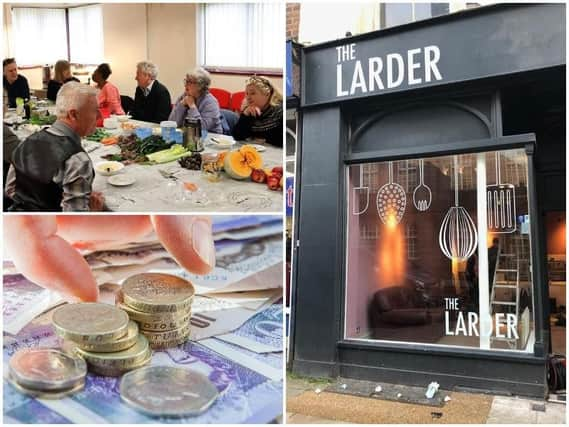City bids to open Bank of Preston: "This will be a bank for the community... to make us resilient"


Preston Council’s next budget proposes setting aside £1m to invest into a community bank and putting £100k towards co-operative projects.
Working with councils across the North West, Preston believes that it can set up a community bank to lend money to local people and create jobs within the county.
Advertisement
Hide AdAdvertisement
Hide AdAs part of the project, there are plans to open dozens of branches on high streets across the region – with a small number in Preston, possible in branches of shutdown traditional banks.


Council leader Matthew Brown said: “We want there to be a physical presence, whether that is reopening in branches that have closed down, or in new locations.
“Some will be manned and others will be automated.
“It will help a lot of local businesses, who often have to travel a long way to pay money in at the end of the day.”
The council is also keen to invest in local co-operatives – such as the Larder project which is setting up a café in the city centre.
Advertisement
Hide AdAdvertisement
Hide AdCoun Martyn Rawlinson, cabinet member for resources and performance, said: “This budget is about using the resources available to Preston Council for the maximum achievable benefit for the people of Preston.
“As everyone knows, since 2011 the government have absolved themselves of responsibility for local services by phasing out the funding of local services from central taxation.
“Preston Council’s grant from government has fallen from £18m a year to zero. Alongside this, the government has increased local government responsibilities for supporting the homeless, the sick, the disabled and the unemployed through welfare reform, scrapping council tax benefit and crisis loans and passing responsibilities on to councils, without providing adequate funding to take on these responsibilities.
“We are proposing to develop the Preston Model policies of the creation of a regional bank with co-operative principles and the creation of more worker co-op businesses in Preston. These policies, alongside the Living Wage Policy will trap more wealth in Preston and give workers more power over their own families futures.”
Advertisement
Hide AdAdvertisement
Hide AdThe council has been running its ‘Preston Model’ for a number of years – the basic idea being to keep wealth within the local community by awarding contracts to local firms.
The community bank would take this model a step further and extend saving and borrowing opportunities to local people.
Coun Brown said: “We would need three million people to join. It would be for people in Lancashire, Merseyside and Cumbria.
“Wirral Council is interested, as is Liverpool and we’ve had discussions with councils in Lancashire.
Advertisement
Hide AdAdvertisement
Hide Ad“We need £20m from all the regions but we are very confident that we will reach that figure.
“With that we can launch a co operative and then pursue a full banking licence. After seven years it will lend half a billion pounds and create lots of jobs.
“It would be fully licensed and it would lend both to individuals but also, crucially, to local businesses because they have a lot of difficulty accessing big banks as interest rates are high.
“The vast majority of people put their money with larger banks which caused the financial crash.
Advertisement
Hide AdAdvertisement
Hide Ad“A North West community bank would basically circulate the money around the community.
“The reality is if you look at how the larger banks invest they don’t invest into the community.
“The whole idea is that its making us more resilient and self-sufficient.”
For the same reasons - making Preston more resilient and self-sufficient - the city council wants to give momentum to co operatives which boost the local economy.
Advertisement
Hide AdAdvertisement
Hide AdThe Larder, a café which will open on Wednesday, February 20 where Ham and Jam once was in Cannon Street, is one such co operative.
Kay Johnson has built up The Larder over the course of the last five years in her spare time. She has had no funding but a great deal of support from former council leader, the late Peter Rankin.
A year ago she was able to secure lottery funding to pay for her time and employ staff on the real living wage.
“I wanted to find a way to carry on the work that we had been doing in the community,” said Kay.
Advertisement
Hide AdAdvertisement
Hide Ad“I’m starting up a business which can then sustain the project. It’s very much about tackling food poverty but we are trying to do it in a way where the business can support the projects.
“There are a few strands to the project. We source everything from local farmers and producers so that we are keeping them in work.
“We are trying to make full use of the premises so we are running accredited catering courses for people who might not see college as an option. We’ve just had an Indian cookery course, for example.
“We do outside catering for the council, individuals and the university because we can guarantee that all our ingredients are locally and ethically sourced.
Advertisement
Hide AdAdvertisement
Hide Ad“And we have a procurement business so we are working with food producers enabling them to sell to other organisations in Preston. It’s very difficult for a smaller business. They are often struggling themselves.
“They don’t have the infrastructure that larger businesses require in terms of quality assurance. We are trying to work with the smaller companies to help them develop a system so we basically do the paperwork.
“We want to make it easy for them to buy and sell locally.”
The city council’s proposed budget for 2019/20 is due to come before councillors at the end of the month.
In addition to the bank proposal, the budget also contains a previously announced rise of 2.99 per cent in council tax payments.
Money matters
Advertisement
Hide AdAdvertisement
Hide AdThe spending power at Preston City Council is £19m in the financial year of 2019/20. Although the figure is up by three per cent since 2018/19 it has dropped by 3.3 per cent since 2015/16.
According to budget proposals for 2019/20, the council is due to spend a total of £20.6m in 2019/20, relying on £1m of reserves to make up the shortfall.
Capital spending amounts to £31.3m, of which £1m will go towards the community bank.
Benefits of a regional bank
Tony Greenham is a policy adviser for The Royal Society for the encouragement of Arts, Manufactures and Commerce (RSA) on inclusive finance.
Advertisement
Hide AdAdvertisement
Hide AdHe is also the executive director of South West Mutual, a co-operative society which has been formed to establish a member-owned high street bank dedicated to the residents and small businesses of Cornwall, Devon, Somerset and Dorset. Even though we do not yet have them in the UK, regional community banks are commonplace in many countries.
Tony told the Post about key five benefits that regional banks bring for local communities:
l “They generally perform better on financial inclusion meaning that everyone is able to get a full current account regardless of their income or credit status. The banks are often more committed to keeping branches open, even in more remote areas.”
l “They do better at lending to smaller companies. Although things are not as bad here for small and medium sized enterprises (SMEs) getting credit as they were in the depths of recession, smaller businesses are still not getting great access to lending when they need it.”
Advertisement
Hide AdAdvertisement
Hide Adl “If you look at the balance sheet for regional community banks a lot more of their lending is to the real economy as opposed to financial businesses. Half of the assets of the big four banks are investing into other banks, hedge funds and other financial investments and not enough of it has been devoted to supporting the real economy, so sectors such as manufacturing, retail and distribution have suffered as a result.”
l “Regional banks by their nature reinvest existing money that is already in the region back into the local economy. For example, SMEs deposit far more into banks than they get out in loans. In Lancashire this would amount to billions of pounds that SMEs are depositing into banks but less than 60 per cent of that will be going back into the county. The rest will be lost to London. That is money that should be reinvested back into the local economy. So the irony is that there is plenty of money in the region, but it is just not being used effectively.”
l “Economic resilience is another benefit. Regional banks tend to be more prudent during boom years. It means that when we have a recession and the large banks are cutting back on their lending to businesses regional banks will be the ones able to pick up the slack and support local economies through the slump.”